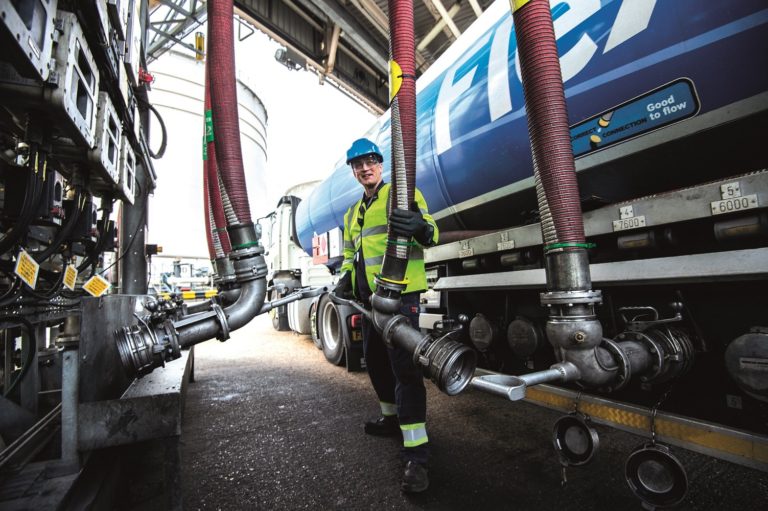
Now Europe’s largest manufacturer of biodiesel from waste the company continues to invest in development fuels that will help drive decarbonisation.
Supplying some 18 billion litres of fuel annually, Greenergy manages fuel supply chains from refinery gates to customer sites which requires a high level of both flexibility and efficiency.
Flexigrid provides specialist fuels distribution and logistics services to both retail and commercial sectors, employing more than 600 drivers and 70 support staff throughout the UK. Each day, Flexigrid fuel deliveries comprise some 600 routes across two shifts.
As a 24/7 logistics business, Flexigrid needed to integrate commercial and retail delivery planning to make scheduling and demand planning faster, easier and more efficient. The solution they chose was AMCS Fuel Planner and Rachel Bligh, IT manager for logistics at Flexigrid, and James Herbert, Greenergy’s head of IT & security, talk about the benefits the software has brought to the business.
The challenges
Offering products and services that span the entire length of the fuel supply chain requires intensive and complex logistics and it is Flexigrid’s flexibility and resilience that differentiates them. According to James, the company’s logistics activities have undergone a significant evolution.
“Flexigrid was set up initially to handle Greenergy’s commercial haulage,” he explains. “But, as the business expanded further, a second system was added for retail logistics. However, this meant the business was operating two programmes separately within the same system which affected flexibility and restricted growth potential.”
Rachel continues: “Working with two separate systems was impacting flexibility, as we were unable to utilise excess vehicles and drivers from one side of the business to meet demand peaks on the other side of the business. Scheduling with AMCS Fuel Planner has improved this.”
“Bringing the commercial and retail operations together into a single system has allowed us to combine planning, which makes cross-business delivery routing possible and the scheduling much more effective and efficient.”
Powerful algorithms
Rachel goes on to explain how the vendor inventory management capabilities have improved delivery accuracy and efficiency, reducing needless fuel costs and emissions.
“This is a benefit that has immediately impacted business results. Where, before, a delivery could sometimes not be made, after the implementation of the AMCS Fuel Planner system we have the ability to manage the customer’s inventory and have seen a real reduction in the number of trucks returning with undelivered fuel as a result.
“The powerful algorithms of AMCS Fuel Planner have taken that service capability to the next level.”
These algorithms allow the system to not only build the most efficient and cost-effective route, but also, uniquely, include the product price and product availability, honouring contractual obligations within its route planning.
Timely updates throughout shift patterns make accurate, real-time information available for billing as well as generating a significant amount of information enabling enhanced visibility to support business decisions.
Operational efficiency
Reducing the resource needed for daily route planning has also improved operational efficiency.
Under their old system, a team of five would create the schedules. On a like-for-like basis, regular planning work now requires the equivalent of two full time employees, freeing up resources for other logistics activities, as well as analysis that will drive further efficiencies.
Competitive advantage – flexibility
Flexigrid, prides itself on offering the highly flexible delivery solutions that the name implies and the system enables them to coordinate a positive response whenever something in the market changes. Enabling them to offer maximum flexibility, even during particularly volatile market conditions, further differentiates the business.
So why AMCS Fuel Planner?
‘We already had experience with AMCS’s customer portals that we used alongside our previous system, so we were aware of some of the capabilities,’ says Herbert.
“When we ran the process, it was the power of AMCS’ algorithm that was the key differentiator among the available options we considered. We felt that the capabilities were truly next level and would deliver big improvements over our old system. It has proven to be a great success.”
Any advice?
The implementation was not without its challenges, however. “Our absolute number one piece of advice to anyone considering implementing this type of system,” says Rachel, “would be to invest time and effort in training your people and help them understand the ‘how and why’ of the new system.”
“Understandably, it can take some time for a team of planners, used to working all out to coordinate deliveries under very tight deadlines, to trust that the system is reliable enough to do that high-pressure work and generate accurate planning.”
Rachel also highlights the risk of underestimating the amount of change a more efficient system makes to the team’s daily workload making careful change management essential.
“Getting everyone on board as early as possible is crucial. Implementing the system in stages can also allow time for users to understand what the system can and cannot do and see a trustworthy output which maximises buy-in.”
And James agrees, adding: “It is important that both the selection and the implementation for this type of solution is business-led.
“For a transport-heavy business with complex logistics such as ours, this is not simply an IT solution. It is a core business system.’
